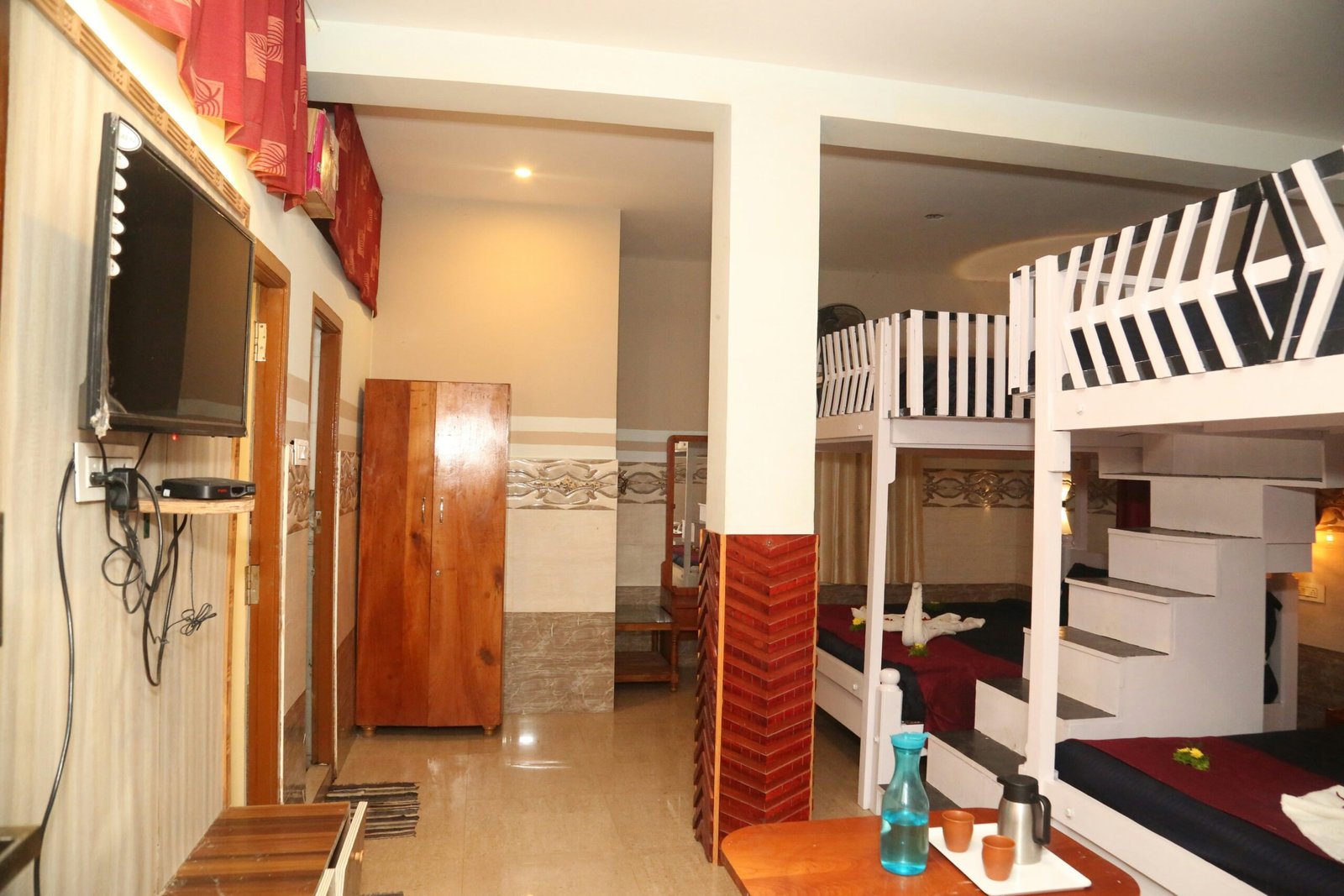Introduction to Budget Accommodation
Traveling is an enriching experience that opens one’s eyes to diverse cultures, cuisines, and lifestyles. However, the financial constraints associated with accommodations often limit travelers’ options. Budget accommodation emerges as an appealing solution, offering travelers an opportunity to explore authentic experiences without stretching their wallets. Unlike traditional hotels that come with high price tags and often generic styles, budget accommodation prioritizes local immersion and affordability.

One of the primary drawbacks of conventional hotels is their tendency to create a uniform experience, stripping away the unique essence of local culture. Travelers often find themselves in environments that feel disconnected from the regional lifestyle. Budget accommodations, including hostels, guesthouses, and homestays, offer firsthand insights into the local way of life. They provide not only a place to rest but also the chance to interact with residents and discover hidden gems that tourists might miss when staying in mainstream hotels.
Economical options such as vacation rentals and the growing trend of co-living spaces invite individuals to participate in community-oriented experiences. These alternatives afford travelers the luxury of connecting with fellow wanderers, exchanging stories, and even forming friendships that transcend geographical boundaries. Furthermore, budget accommodations often channel funds back into local businesses, fostering economic stability within the community.
While budget accommodation is an enticing option, it is essential to approach it with an understanding of what to expect. Researching the character and reputation of the options available is crucial to ensuring a pleasant stay. In the following sections, we will delve into various types of budget accommodations, showcasing their benefits and how they can cater to diverse traveler preferences.
Guesthouses: A Cozy and Local Experience
Guesthouses have emerged as a favored accommodation option for travelers seeking an authentic experience without the hefty price tag associated with hotels. Often run by local families or small companies, these establishments provide a unique opportunity to immerse oneself in the local culture. Typically, guesthouses are designed to feel homely, offering personalized touches that larger commercial hotels may lack. Whether it’s a warm welcome or local culinary specialties, these intimate settings help create memorable experiences.

Affordability is one of the primary advantages of opting for a guesthouse over a traditional hotel. Prices usually reflect the modest setups and services provided, making guesthouses a budget-friendly lodging choice. Many guesthouses offer complementary amenities, such as breakfast and Wi-Fi, which can further enhance their value. Additionally, compared to hotels, they often have fewer hidden fees, allowing travelers to better manage their budgets while on the road.
A stay in a guesthouse not only provides economical lodging but fosters genuine connections with the community. Hosts are typically well-informed about the area and can offer recommendations for local attractions, dining options, and hidden gems off the beaten path. This local insight can significantly enrich the travel experience, allowing guests to explore the destination like a resident rather than a tourist.
When looking for guesthouses, travelers can utilize various online platforms and travel forums dedicated to reviews and travel tips. Websites specializing in home-stays can offer insights into availability, pricing, and host ratings. Reading reviews and testimonials can also provide potential guests with a clearer picture of what to expect. Booking in advance, especially during peak seasons, can further ensure that one secures a comfortable and memorable stay in these charming accommodations.
Hostels: More Than Just Shared Rooms
Hostels have long been stereotyped as accommodations exclusively for young backpackers seeking budget-friendly lodging options. However, the modern hostel landscape has evolved, offering a wide variety of experiences that cater to different travelers, including families, couples, and professionals. This shift demonstrates the versatility of hostels as a viable alternative to traditional hotels, appealing to a broader audience while maintaining affordability.
One of the distinguishing features of hostels is the strong sense of community they foster. Guests often engage in communal activities such as cooking classes, guided tours, or social nights, allowing individuals from diverse backgrounds to connect and share their travel experiences. This social aspect can be particularly beneficial for solo travelers who might otherwise feel isolated. By staying in a hostel, they can easily forge friendships and gain local insights that might not be readily available through conventional accommodations.
In addition to shared dormitories, many hostels now offer private rooms at competitive prices, making them suitable for travelers who prefer a bit more privacy without forgoing the hostel experience. These private accommodations often come equipped with essentials like Wi-Fi and comfortable bedding, further enhancing guest satisfaction. Such diversity in room configurations enables travelers to select the option that best suits their individual needs and budgets.
Affordability remains a key attraction of hostels, as their prices tend to be significantly lower than those of hotels. This budget-friendliness allows travelers to allocate more of their funds toward experiences, such as excursions, dining, and activities. However, not all hostels are created equal, and it is essential for prospective guests to conduct research by consulting reviews, ratings, and recommendations to find reputable hostels that meet their standards for quality and security.
Couchsurfing: Stay with Locals for Free
Couchsurfing is an innovative approach to traveling that encourages cultural exchange and engagement with locals while minimizing accommodation costs. By utilizing the Couchsurfing platform, travelers can connect with hosts willing to offer a place to stay free of charge, ultimately fostering a sense of community and shared experiences. To get started with Couchsurfing, the first step is creating a profile on the Couchsurfing website or app. A complete profile, which includes a clear profile picture, personal interests, and travel preferences, increases the chances of finding a compatible host.
Building a good reputation on Couchsurfing is crucial for both hosts and travelers. Upon each stay, guests have the opportunity to leave feedback and ratings for their hosts, and vice versa. Positive reviews not only enhance credibility but also encourage other users to open their homes to you. Additionally, engaging with potential hosts through thoughtful messages can significantly improve the chances of a successful stay. Expressing genuine interest in their lives, culture, and local attractions will set you apart from other travelers seeking free accommodation.
Safety is paramount when participating in Couchsurfing. It’s essential to research potential hosts thoroughly by reading their reviews and observing their activity on the platform. Engaging in conversations prior to arrival helps establish a level of comfort and ensures compatibility. Always communicate through the Couchsurfing website or app to maintain one’s safety. Bringing along a travel buddy can also contribute to a more secure experience. Ultimately, Couchsurfing offers a unique opportunity to acquire authentic travel experiences not typically found in conventional accommodations. By focusing on building relationships and practicing safety, travelers can create lasting memories while enjoying a budget-friendly alternative to hotels.
Local Rentals: Short-term Rentals for Authentic Living
In recent years, short-term rental options such as Airbnb and Vrbo have gained immense popularity among travelers seeking authentic living experiences. Unlike traditional hotels, local rentals offer unique benefits that can enhance your stay while keeping costs manageable. One of the primary advantages of choosing a rental property is the increased space and privacy it provides. Travelers can opt for entire homes, apartments, or even shared accommodations, allowing for a more personalized experience tailored to individual needs.
Access to amenities such as kitchens is another significant benefit of short-term rentals. Having the ability to prepare meals not only promotes healthier eating habits but also saves considerable money that would otherwise be spent on dining out. Many local rentals come equipped with essential kitchen appliances, making it convenient for guests to cook and enjoy meals at their leisure. This can be particularly advantageous for families or groups who prefer the comfort of shared meal experiences over eating out.
When choosing budget-friendly local rentals, it’s essential to consider a few key factors that can enhance your overall experience. Start by reading reviews from previous guests to gauge the quality and authenticity of the property. Look for listings in neighborhoods that reflect the local culture, as this can enrich your stay by providing insights into the community. Furthermore, utilize filtering tools available on rental platforms to narrow down options that fit within your budget while displaying listings that meet your criteria. Ensuring clear communication with hosts can also assure a smoother check-in process and provide valuable local insights.
By selecting short-term local rentals, travelers can experience a refreshing alternative to conventional hotels, offering affordability, authenticity, and the comforts of home. In a world increasingly leaning toward personalized experiences, these accommodations stand out as a prime choice for budget-conscious travelers seeking genuine connections with their destinations.
Tips for Finding the Best Deals on Alternatives
When searching for budget-friendly accommodation, travelers can benefit from a number of strategies to secure the best deals. One effective method involves utilizing comparison websites that aggregate prices from various sources. Platforms such as Booking.com, Expedia, and Trivago allow users to compare different lodging options side-by-side, helping them to identify the most affordable choices for their specific needs and preferences. It is advisable to filter results based on key criteria such as price, location, and amenities to ensure that the alternatives presented match the traveler’s expectations.
Another crucial aspect of finding budget accommodation lies in timing. Booking during off-peak seasons can lead to significant savings. Flight and lodging prices tend to be lower when fewer tourists are traveling to a particular destination. By avoiding peak holiday periods, travelers increase their chances of finding discounted rates on alternative accommodations. Additionally, travelers should consider planning their trips mid-week, as weekends typically see a surge in demand and prices, especially for hotels and other types of rental lodgings.
Moreover, travelers can take advantage of loyalty programs and discounts that many accommodation providers offer. Signing up for loyalty programs with booking websites or specific lodging brands can lead to exclusive perks such as discounted rates, free nights, or upgrades. Always search for available coupons or promotional codes before finalizing any booking, as these might provide additional savings on budget options. Utilizing social media and subscribing to newsletters from travel websites can also keep travelers informed about limited-time offers.
By combining these strategies—using comparison tools, opting for off-peak travel, and leveraging loyalty programs—travelers can optimize their search for affordable lodging and enjoy a more cost-effective travel experience without sacrificing comfort or quality.
Safety and Practical Considerations
When exploring budget-friendly accommodation options beyond traditional hotels, safety is often a primary concern for travelers. Understanding how to navigate this landscape effectively involves thorough research and awareness of certain factors that enhance both security and peace of mind during your stay.
Begin by examining the safety of the neighborhood where the accommodation is located. Utilize online maps and local crime statistics to gauge the area’s safety. Numerous websites provide insights into crime rates and community safety, which can help inform your decision. Additionally, resources like neighborhood forums or community social media pages offer travelers’ perspectives, providing anecdotal accounts of experiences in specific areas.
Reviews from other travelers are invaluable when assessing budget accommodations. Platforms like Airbnb, VRBO, and Hostelworld feature user-generated content that outlines personal experiences regarding safety and overall satisfaction. Look for patterns in reviews—positive comments concerning host communications, secure property features, and responsive customer service can indicate a reliable option. Equally, be cognizant of red flags; consistent negative feedback, particularly about safety concerns, should guide your choices.
Consider essential practical factors such as the presence of secure locks, adequate lighting, and emergency exits. It is beneficial to confirm whether the accommodation has features like 24-hour surveillance, on-site personnel, or proximity to emergency services. Introducing elements such as travel insurance can also add an extra layer of protection, ensuring you are covered should unforeseen situations arise.
By prioritizing these safety and practical considerations while assessing non-hotel accommodations, travelers can enjoy a more secure and enriching experience, fully embracing the authenticity that these alternatives offer.
Making Connections: Engaging with Your Hosts
When considering budget-friendly accommodation options, one of the most significant advantages lies in the opportunity to engage with your hosts and immerse yourself in the local culture. Establishing a connection with your host can enhance your travel experience, providing insights that go beyond standard tourist attractions. One effective way to start this interaction is by simply asking for recommendations. Hosts often possess a wealth of knowledge about their locality—hidden gems, popular dining spots, and cultural events—which may not be found in guidebooks.

In addition to asking for tips, it is beneficial to join local events that your host may recommend. Whether it’s a community festival, market day, or a cooking class, participating in these events can help you create meaningful memories while providing a deeper understanding of the local customs and traditions. Engaging in such activities not only fosters a sense of belonging but also allows you to meet fellow travelers and locals, enhancing your overall experience.
Furthermore, understanding and respecting cultural norms can significantly enhance interactions with your host. Each region may have its own social etiquette and customs. Taking time to learn about these practices, such as greetings, dining etiquette, or gift-giving traditions, demonstrates respect and openness, laying the foundation for a mutually rewarding relationship with your host. Such connections enrich your stay by transforming your accommodation experience from a mere logistical necessity to a genuine exchange of cultures.
In conclusion, engaging with hosts and local communities is vital for creating an authentic and rewarding travel experience. By actively participating in local events, seeking recommendations, and understanding cultural norms, travelers can enjoy a deeper connection to their destination, making their budget-friendly accommodation a catalyst for adventure and personalization.
Conclusion: Embrace Authenticity and Affordability
As we have explored throughout this post, opting for budget-friendly accommodation alternatives presents a wealth of opportunities for travelers seeking authentic experiences. Unlike traditional hotels, which often prioritize uniformity and luxury, alternative lodgings such as hostels, guesthouses, and vacation rentals provide a unique chance to immerse oneself in the local culture and lifestyle. These accommodations often boast character and charm, offering a glimpse into the everyday lives of residents in the area.
Choosing budget-friendly options can significantly enhance your travel experience. Not only do these alternatives help to manage your finances while away from home, but they also encourage meaningful connections with fellow travelers and locals alike. Whether sharing stories with new friends in a shared kitchen or receiving personalized recommendations from a host, these interactions enrich your journey and offer insights that cannot be found in a guidebook. Furthermore, many of these inexpensive lodgings are located in vibrant neighborhoods off the beaten path, allowing you to explore areas of the city not typically frequented by tourists.
Budget-friendly accommodations are also environmentally sustainable choices. Many of them embrace eco-conscious practices that minimize their impact on the environment while supporting local economies. By choosing these alternatives, travelers contribute to a more sustainable tourism model that prioritizes community involvement and preservation, making their adventures not only enjoyable but also responsible.
In summary, embracing authentic, budget-friendly accommodations allows you to step away from the conventional tourist experience, fostering personal growth, cultural engagement, and unforgettable memories. With these compelling benefits in mind, the next time you plan your travels, consider exploring the diverse world of alternative lodgings that await you beyond the hotel walls.
